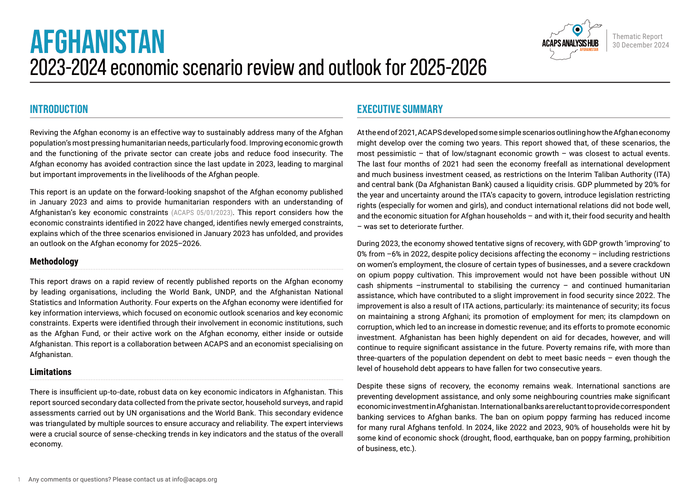INTRODUCTION
Reviving the Afghan economy is an effective way to sustainably address many of the Afghan population’s most pressing humanitarian needs, particularly food. Improving economic growth and the functioning of the private sector can create jobs and reduce food insecurity. The Afghan economy has avoided contraction since the last update in 2023, leading to marginal but important improvements in the livelihoods of the Afghan people.
This report is an update on the forward-looking snapshot of the Afghan economy published in January 2023 and aims to provide humanitarian responders with an understanding of Afghanistan’s key economic constraints (ACAPS 05/01/2023). This report considers how the economic constraints identified in 2022 have changed, identifies newly emerged constraints, explains which of the three scenarios envisioned in January 2023 has unfolded, and provides an outlook on the Afghan economy for 2025–2026.
Methodology
This report draws on a rapid review of recently published reports on the Afghan economy by leading organisations, including the World Bank, UNDP, and the Afghanistan National Statistics and Information Authority. Four experts on the Afghan economy were identified for key information interviews, which focused on economic outlook scenarios and key economic constraints. Experts were identified through their involvement in economic institutions, such as the Afghan Fund, or their active work on the Afghan economy, either inside or outside Afghanistan. This report is a collaboration between ACAPS and an economist specialising on Afghanistan.
Limitations
There is insufficient up-to-date, robust data on key economic indicators in Afghanistan. This report sourced secondary data collected from the private sector, household surveys, and rapid assessments carried out by UN organisations and the World Bank. This secondary evidence was triangulated by multiple sources to ensure accuracy and reliability. The expert interviews were a crucial source of sense-checking trends in key indicators and the status of the overall economy.












Leave a Reply